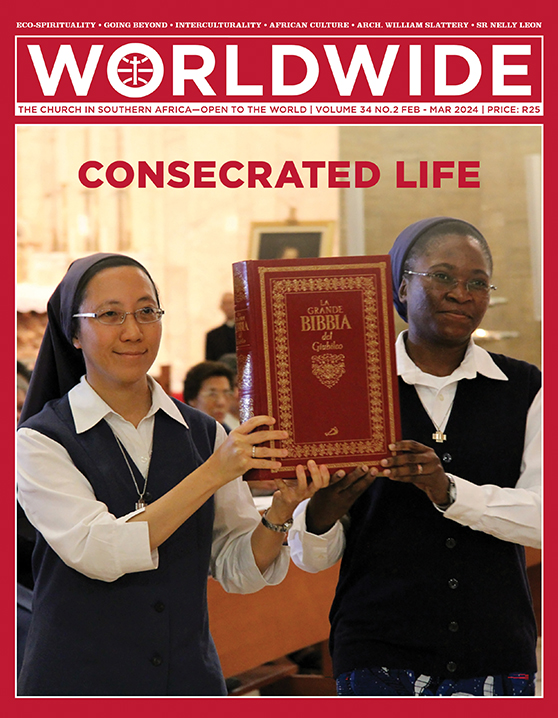
CONSECRATED LIFE
The painting on the front cover entitled “The disciples of Emmaus” reflects our journey of hope. Jesus not only walks with us, but gives us the wisdom to perform our ministries and opens our eyes to see Him in the people that we are serving.
PROFILE • SR NELLY LEON CORREA

AN ANGEL OF LIGHT IN THE CHILEAN PRISONS
Being an incarcerated female presents a double predicament. Sr Nelly Leon, a religious member of the Congregation of the Good Shepherd, accompanies and supports imprisoned Chilean women and helps them pursue their reintegration into society once they have been released. Staying with them, inside the penitentiary, during COVID-19, has brought her even closer to the internees and made her an integral part of their lives, bearing testimony to Gospel values.
BY MARIAN PALLISTER | CHAIR OF PAX CHRISTI SCOTLAND
“I was in prison and you visited me” (Mt 25:36). Prison visits are not on the agenda for most of us, despite the rising figures of those whose punishment for wrong-doing is a spell behind bars. The response to Matthew 25:36 is, of course “…whatever you did for one of the least of these brothers of mine, you did for me” (Mt 25:40), and Jesus clearly knew the pain suffered by those who (especially in His times) were sentenced to imprisonment.
Ministry of solidarity in women’s prisons
When our sisters are in prison, their world is “filled with pain, anger, guilt, frustration, but above all with the suffering of those mothers who are separated from their children”.
These are the words of someone who knows only too well what that suffering is like—not because she has been a prisoner, but because she has voluntarily shared her time nurturing in them the dignity that incarceration all too easily destroys.
Sr Nelly Leon Correa, a member of the Congregation of the Good Shepherd who is in charge of a ward in the women’s prison of Santiago in Chile, was faced with not being able to do her job as chaplain when the COVID-19 pandemic placed restrictions on movement around the world. Instead of acquiescing to the authorities’ orders to cease going into the prison, Sr Nelly persuaded them that she should stay with the women in the prison for the duration of the restrictions.

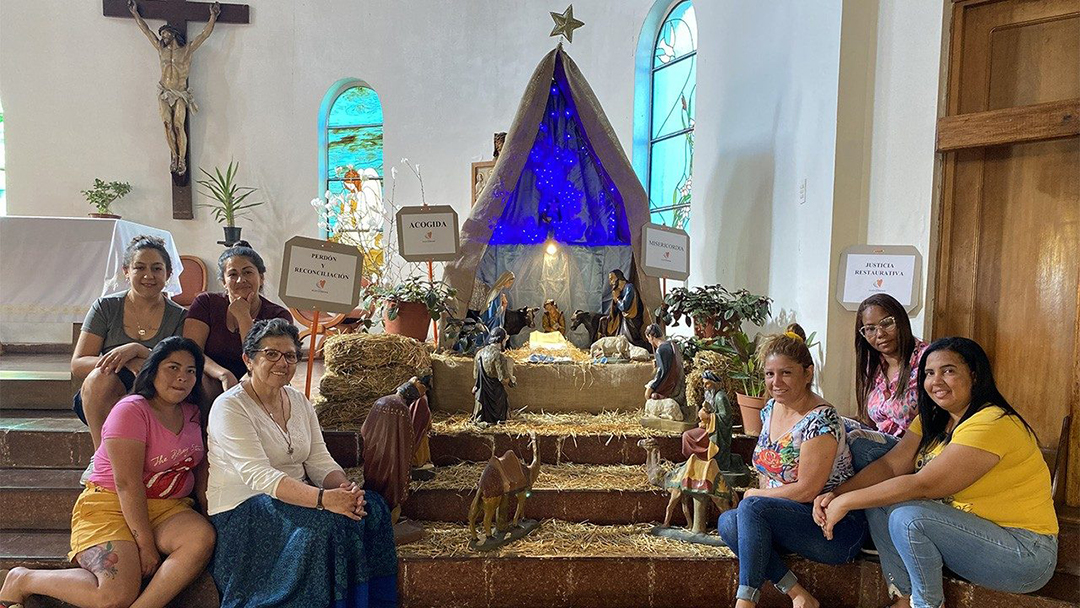
She was, of course, not aware of the fact that this decision would effectively sentence her to 18 months behind bars, but the more we get to know about Sr Nelly, the less surprising her decision becomes. Her entire personal ethos involves acting for “the least” in society—and in Chile, these imprisoned women are considered amongst the “least”.
Imprisoned women stats
According to the Institute for Crime and Justice Policy Research’s World Female Imprisonment List, there are around 740,000 female prisoners worldwide, an increase of a massive 60% since the beginning of this century. Female prisoners account for 6.9% of the global prison population, but in the Americas, the figure is 8%. There were 3,219 female prisoners in Chile’s jails in 2022 (the last available figures), which accounts for 17.1 % of its prison population.
Most of these women come from the poorest areas of the country. Although levels of poverty are decreasing in Chile, the women whom Sr Nelly encounters live on far less that the $3 a day offered as the bar under which the poorest sink.
Immersed in their lives
Prior to the pandemic, Sr Nelly would visit the women on a daily basis. Once she started sharing their experiences behind bars, she learned so much more about their lives, their emotions and their despair than she had in the decades since beginning her prison work.
She explained that before the pandemic, she left the prison at the end of each day, and despite having worked closely with the women to console their anxieties and fears, she was able to switch off. “Having to stay in prison during the pandemic allowed me to attend to them until later in the day,” she said. “I could walk the corridors during the night surrounded by a profound silence that was broken at times by the heart-breaking cries of anguish coming from the cells.”.
Staying with them during the pandemic was a “point of no return” in Sr Nelly’s life which allowed her to get to know the women much more intimately.
Like most women around the world, the prisoners in the Santiago jail are there mainly for minor crimes, yet their sentences are long, and they are separated from their children. Sr Nelly said that staying with them during the pandemic was a “point of no return” in her life which allowed her to get know the women much more intimately.
She states, “They live for years inside a place they don’t want to be, in conditions they do not want to live in. This is an open wound that produces suffering and nostalgia.” And Sr Nelly shared those conditions; she “did this for the least of My sisters”.
The 18 months of incarceration during the pandemic may have been a more intense period for Sr Nelly, but her intention to carry through with this plan was nothing new. She began her career as a student of Pedagogy in Religion at the Silva Henrique Catholic University in Chile, graduating in the early 1980s. Her working life has been dedicated to caring for those women whose freedom has been taken from them, and to empowering those released back into society to restore their lives, their rights and their ability to once again play a role in their communities.
Reintegration into society
Sr Nelly does not limit her response to Matthew 25:36 to prison visits only. In 2009, together with Fr Alfonso Baeza, she set up the Fundación Mujer Levántate, an organisation which aims to put women back on track once they leave the Santiago cells behind. The name of the organisation translates to “Lifting up women” or “Women getting up”, and it’s all about, as Sr Nelly explains, “…reintegration into society, the workplace and the families of these sisters who, having regained their freedom after years behind bars, do not want to fall back into crime”.
She set up the Fundación Mujer Levántate, an organisation which aims to put women back on track once they leave the Santiago cells behind.
The organisation houses a number of former prisoners, supporting their first steps back into society and freedom. And that freedom is obviously lived out in the poverty that led them to commit crimes in the first place. Sr Nelly told Pope Francis during his visit to the prison in 2018 that in all the years that she had worked in Chilean prisons: “I’ve never had a person who came from a place of privilege.” She added, “They come from the peripheries of Santiago, from a world impoverished not just materially but of values, too. They grow up in families where no one worries about the kids, nobody ensures that they go to school.”
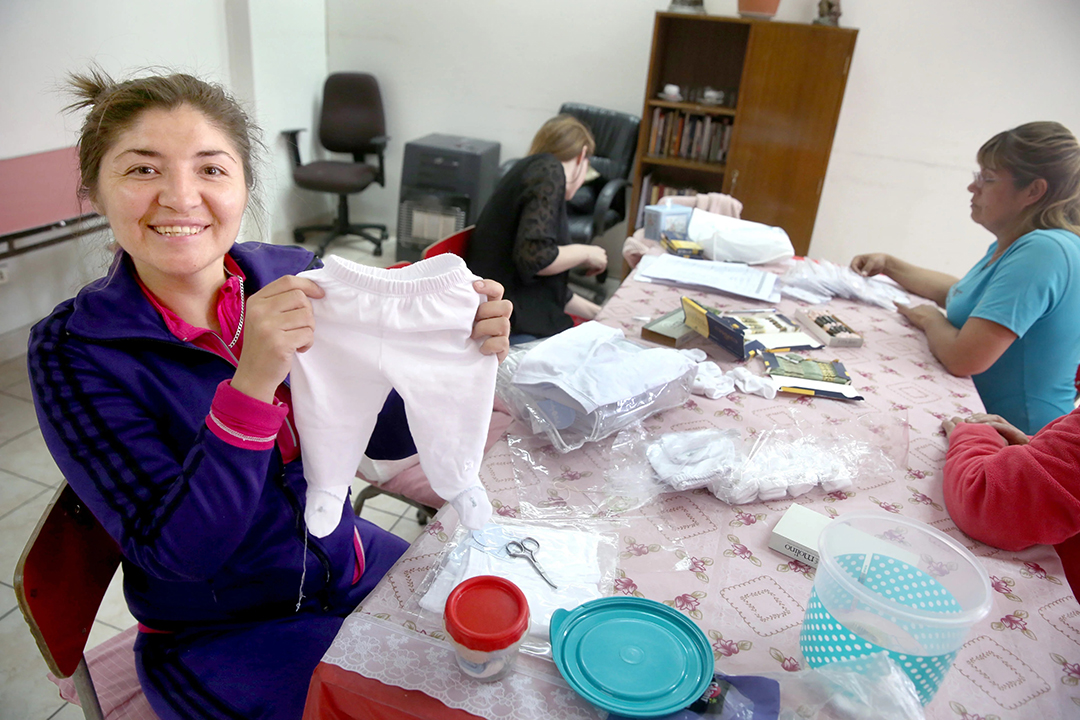
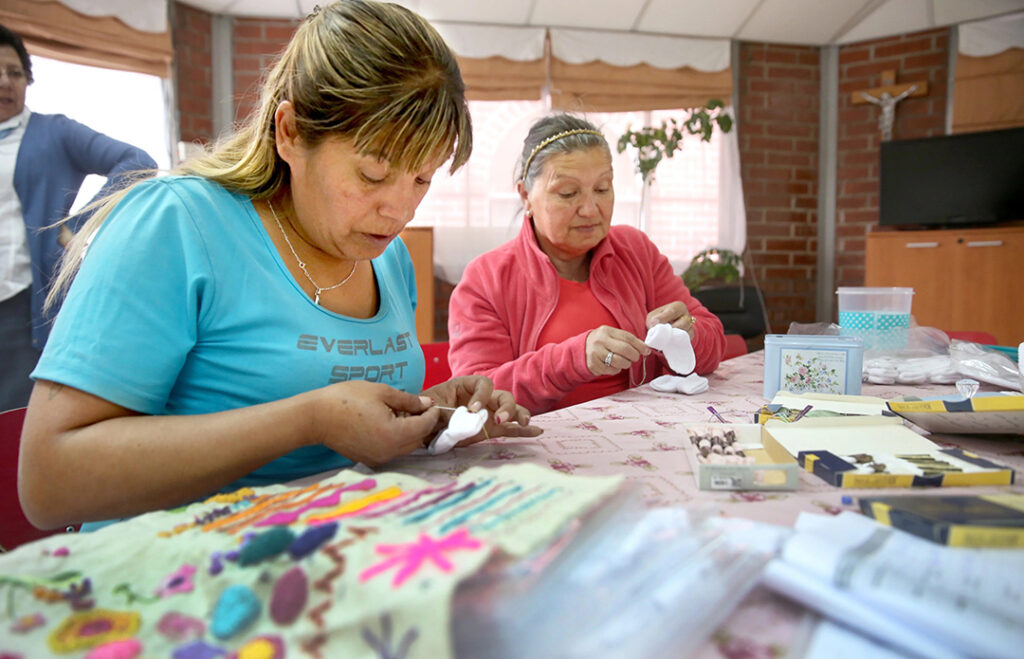
Sr Nelly has said that their poverty goes far beyond lack of money. “The poverty is also moral and spiritual. It’s not that they don’t believe in God. Nobody has ever shown them God, brought God to them.” She doesn’t believe that the country has in any way tried to change things, leading her to state categorically: “Chile imprisons its poor.”
This all may sound harsh—but it is nothing short of the reality, and it is doubtful that there will be change in the near future. Despite a left-wing government which came to power in December 2023, the Chilean electorate voted to retain the right-wing constitution introduced by the dictator Pinochet in the 1980s, which offers the poor very little hope.
Sr Nelly already fears for the children of the sisters she works with in the penitentiary, seeing the whole system as “a revolving door”.
Light within the darkness
Those women that she works with do not, however, take Sr Nelly’s involvement in and work with them for granted. Back in 2018 when Pope Francis visited the San Joaquin penitentiary for women in Santiago, he met with a number of the prisoners, who shared with His Holiness their gratitude for the presence of this religious sister in their lives. One said that Sr Nelly was “the light within the darkness of these prison walls”, adding that “…she never judges us for once having fallen and instead just focuses on our next step forward. She looks forward for our children, for our families, for ourselves”.
Unsurprisingly, Pope Francis told Sr Nelly, “You are a champion”, and her work has not gone unsung in Chile, despite her criticism of the government. She was one of seven women who received an award for her leadership and work for women’s rights on International Women’s Day in 2013. She was named as one of the 100 Women Leaders of 2021 in the Social Services category. This award came from the newspaper El Mercurio and the Women Entrepreneurs organisation— and it was the third time she had received the award for her work with the women of San Joaquin Women’s Prison. In 2022 she received the Cardinal Raul Henrique Medal from her Alma Mater, the Silva Henrique Catholic University. The Cardinal after whom the university was named had himself been a great advocate for human rights, and the university was celebrating its 40th anniversary.
“Today I can say that this time in prison was the best thing that could have happened to me in my consecrated life.”
Sr Nelly made sure the occasion raised awareness of the plight of the women she cares for. In what was described as an emotional ceremony, she received the medal during the 14th anniversary mass of Fundación Mujer Levántate at San Joaquin Women’s Penitentiary. She naturally gave credit to the university, saying “I asked the university authorities to come to this place because everything I am and have achieved is because of you.” There couldn’t have been a better way of shining the spotlight on the women she embraces in their daily needs.
Award to Fundación Mujer Levántate
Reports of the award went viral, highlighting the fact that this foundation impacts the lives of over 300 boys and girls annually, working as it does with around 100 women being released from prison—and obviously raising awareness of the high number of women in this Chilean jail
All the top brass from the university crowded into the prison chapel, and Sr Nelly was told her award was for “her permanent commitment to those who suffer the deprivation of liberty, vindicating their dignity and pursuing their reintegration into society, thereby reflecting the validity of the conviction of Cardinal Raul Silva Henrique, and faithfully representing the values of a graduate of our university”.
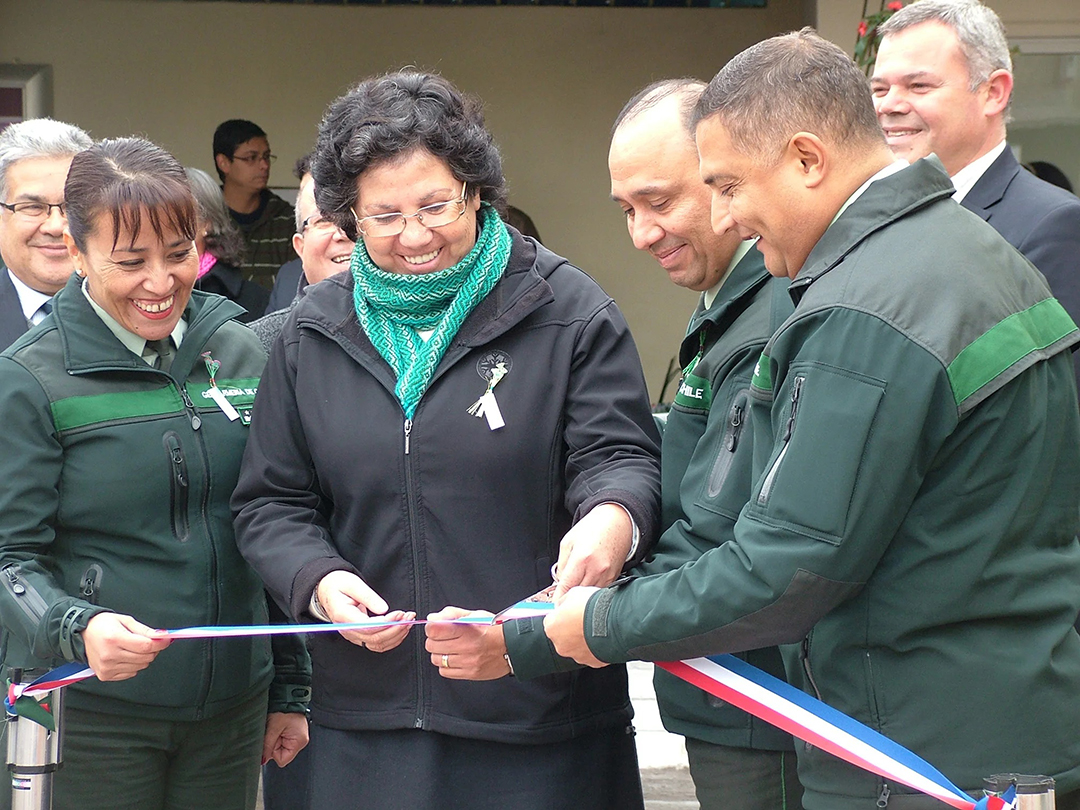
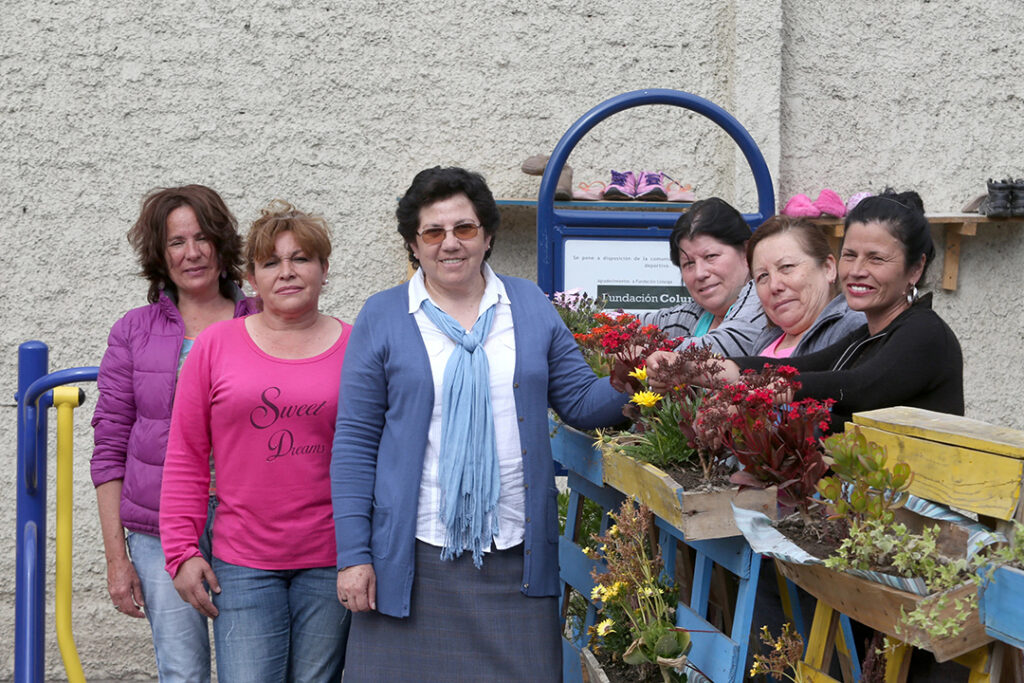
Sr Nelly Leon will never let any opportunity slip by without taking advantage of it for her “sisters” in prison. After the visit of Pope Francis, she told Global Sisters Report, “It was like seeing the papacy back in its original purpose, among the poor.”
Placing herself so deeply in the realms of the poor during the pandemic; seeking to do what she did “for the least of His sisters” and thereby for Christ himself, is a task she is convinced God was asking of her. She has said, “Today I can say that this time in prison was the best thing that could have happened to me in my consecrated life.” Sr Nelly Leon is not only an inspiration to the prisoners she works with, but to us all.

